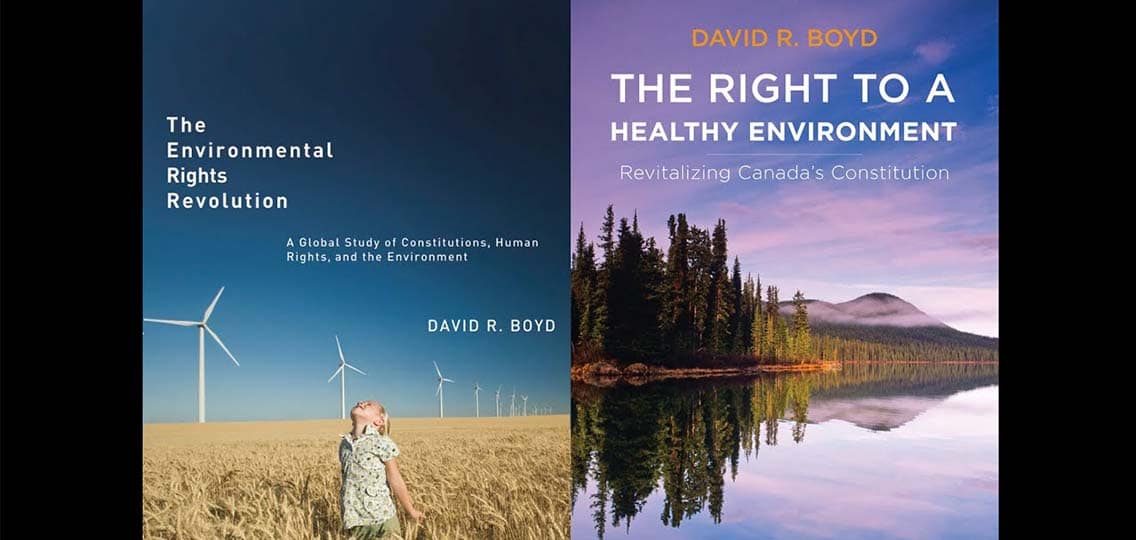Dr. David R. Boyd is one of Canada’s leading environmental lawyers. An adjunct professor in Resource and Environmental Management at Simon Fraser University and a recent Trudeau Scholar at the Institute for Resources, Environment and Sustainability at UBC, he has advised many governments—from Canada to Sweden—on a range of environmental issues.
Boyd is currently advocating for amending the Canadian constitution to include the right to a healthy environment. His latest of six books, The Right to a Healthy Environment: Revitalizing Canada’s Constitution, makes a strong and compelling case for it.
Docs Talk: What would a constitutional right to a healthy environment mean for Canadians? How could it change the way we live?
Dr. Boyd: A constitutional right to live in a healthy environment would have a transformative effect on Canada. Canadians would have a greater role in making decisions that affect the environment, our health and our communities. If governments and industries failed to respect our right to a healthy environment, we could hold them accountable. Over time, Canadians would breathe cleaner air, drink safer water, be exposed to fewer toxic chemicals, and enjoy healthier ecosystems.
If our constitution included the right to a healthy environment, there is no way our national rules would allow five times the level of sulphur dioxide in our air than is permitted under American rules. Canada would have to revisit the approval of hundreds of pesticides no longer used in Europe because of health and environmental concerns. And we’d have to make an urgent effort to deliver safe water to communities suffering under long-term boil water advisories.
DT: Ninety-five countries have already recognized this right. How are their citizens putting the right into action?
Dr. Boyd: The most extraordinary example comes from Argentina, where a public health worker named Beatriz Mendoza moved to a neighbourhood in Buenos Aires that the oil and gas industry had heavily polluted. When Mendoza’s health began to suffer, she hired a lawyer and sued the federal, provincial and municipal governments as well as 44 companies for violating her constitutional right to a healthy environment.
The case eventually reached the Supreme Court, which decided that Mendoza’s right had been violated and required all levels of government to clean up the watershed, build infrastructure for drinking water and sewage treatment, implement environmental monitoring and address citizens’ health problems. Since then, there has been remarkable progress in the area.
Another example: last year Chevron spilled oil off the coast of Brazil. They were immediately fined $28 million, roughly 10 times the total fines levied under the Canadian Environmental Protection Act in the 25 years since it was passed in 1988. Brazilian prosecutors are seeking billions of dollars in compensation for harm to the environment and jail sentences of up to 30 years for Chevron executives.
DT: Do countries with the right to a healthy environment actually have healthier environments and people?
Dr. Boyd: In general, these countries have smaller ecological footprints, rank higher on comparisons of environmental performance and have done a better job of addressing issues such as air pollution and climate change than countries like Canada whose constitutions lack this right. If you look at the environmental records of countries in the Organization for Economic Cooperation and Development, which includes most of the world’s wealthy industrialized nations, you find 14 of the top 15 nations have constitutional provisions mandating environmental protection. Six of the seven countries with the worst environmental records lack constitutional protection for the environment.
DT: What is it going to take to convince our government to change the constitution?
Dr. Boyd: An amendment needs to gain the support of Parliament and seven out of 10 provinces in a three-year period. So while it will be a challenge to change the constitution, it’s not impossible—especially since a recent poll found that nine out of 10 Canadians support protection of the right to a healthy environment.
It’s also heartening to see how other countries have embraced such constitutional change. In France a few years ago, President Chirac demonstrated tremendous commitment in promoting a Charter for the Environment, and the people of France were overwhelmingly supportive. In Ecuador and Bolivia, Indigenous people played a key role in constitutional reforms that not only recognized the right to a healthy environment but also the rights of Nature.
DT: Can we also tackle environmental rights at provincial, territorial and municipal levels? How?
Dr. Boyd: Canadians should demand that their provincial, territorial and municipal governments enact environmental bills of rights or strengthen existing laws. Quebec is a leader in this regard, recognizing the right to a healthy environment in both its Environmental Quality Act and its Charter of Human Rights and Freedoms. Ontario, the Yukon, the Northwest Territories and Nunavut also have laws recognizing this right, but these laws are weak and do not give citizens the tools needed to protect their rights. Montreal recently became the first Canadian city to recognize environmental rights and responsibilities.
The David Suzuki Foundation and Ecojustice Canada are working together to ensure every Canadian receives legal protection of their right to a healthy environment. Find out more here and take action today.
This article originally appeared on the David Suzuki Foundation’s website.


